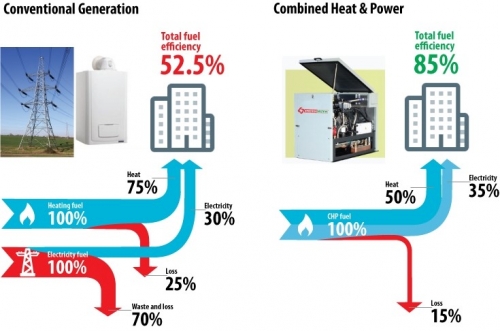The provision of this technology means that businesses in areas enjoying mains gas can now access isoenergy’s considerable expertise to help to reduce costs and carbon emissions.
The ability to make optimal use of energy has been a key tenet in the 10 years that isoenergy has been established and many hundreds of customers are now enjoying the benefits that accrue from focusing on CO2 and cost reduction.
CHP offers a way to generate electricity and heat on site and reduce costs in the process:
When electricity is delivered to a property by the National Grid, the process of generating the electricity and transmitting it to the end user can result in losses of as much as 2/3 of the calorific value of the fuel used to generate it. A Combined Heat and Power (CHP) system within a building makes use of a single energy source, such as natural gas or biogas, to generate both electricity and heat for on-site use. By generating electricity close to where it is used there is a saving in cost and CO2 because there are none of the losses caused by the transmission of power. The remaining heat from the generation can also be used for heating and hot water. Consequently the electricity generated is less expensive than buying electricity in from national suppliers both in terms of cost and environmental impact from CO2
Based around a gas powered engine the principle of a CHP unit is very simple:
The engine drives an electrical generator which provides low cost electricity for use in the property. Every kilowatt used, reduces the quantity of electricity that is imported from the grid.
Heat exchangers are fitted both to the cooling system of the engine and to the exhaust system. The heat harvested is then used for heating or hot water within the building. The result is that the combination of electricity and heat mean that the total efficiency of the unit can be expected to be above 85%
CHP has proved to be a great investment in a range of different sites from industrial processes through to hotels and other leisure facilities. Careful analysis of the energy profile of a given building is essential to ensure the most efficient use of the CHP unit and this is where isoenergy’s expertise is invaluable.
For example, a hotel was determined to need a CHP plant with a 33kWe capacity. Prior to installation the client was consuming £83,500 of electricity and £50,000 of gas to run the boiler for heating and hot water. A total of £133,500 fuel expenditure.
After the installation of the CHP unit the imported electricity bill reduced to £28,700, the gas required for the boiler was £18,200 and the gas for the CHP unit was£ 41,300, totalling £88,200.
Consequently the net saving in energy costs was some £45,000 per year, a 33% reduction in overall cost.
Natural Gas which is available to over 90% of the country has been the most economical way to heat a building for many years. It is comparatively clean, efficient and extremely convenient to use. Making use of that gas for local generation of electricity is a comparatively recent development but the advantage of eliminating the transmission losses of electricity from the mains and making use of the heat produced in generation makes CHP a great option for any business with a year round demand for heat.







